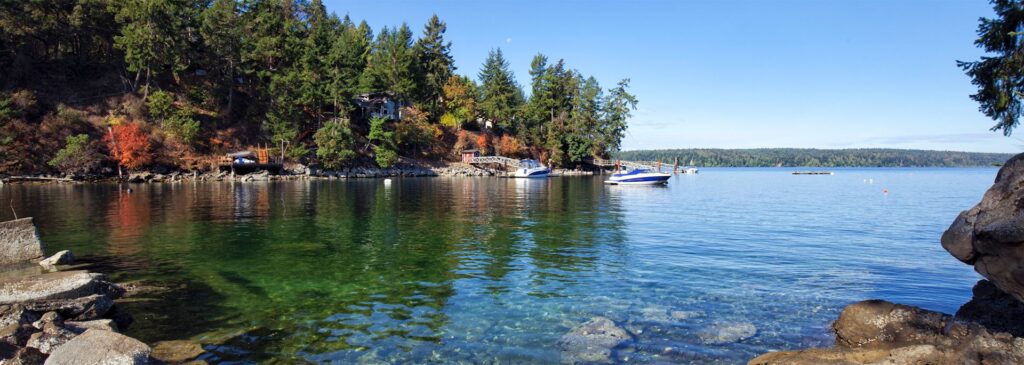
Building a Community-Driven Climate Action Plan Amidst a Pandemic
When the COVID 19 pandemic first hit, Salt Spring Island’s Climate Action Plan Steering Committee initially postponed their Climate Action Plan public engagement because traditional face-to-face meetings weren’t an option. But with the Ethelo platform, they found a way to meaningfully engage a diverse group of residents in the discussions online, educate them about the trade-offs involved and create consensus around the final outcome.
With help from Ethelo and eDemocracy’s digital marketing and participant recruitment services, Salt Spring reached its goal of hearing from a diverse group that made up 14 percent of the island’s residents. And the Ethelo algorithm helped them develop a plan that met their ambitious GHG reduction targets, which had 82 percent support from the residents who participated.
936
participants
5000
comments

CRD LOCALLY ELECTED OFFICIAL
When the Salt Spring Island local governments declared a climate emergency in 2019, residents quickly realized they needed to update their 2011 Climate Action Plan (CAP) if they hoped to reach their 2030 greenhouse gas (GHG) reduction targets.
The CAP Steering Committee used the United Nations recommendation to set a goal of reducing GHG emissions by 50 percent by 2030. They worked with a number of different island organizations including local non-profit Transition Salt Spring, and local government officials, to identify mitigation and adaptation strategies. Then they collaborated with Ethelo and eDemocracy to plan a public engagement to hear community perspectives that would inform the plan.
When the COVID 19 pandemic hit in early 2020 and the face-to-face component of the community consultation the CAP Steering Committee had planned was no longer possible, and they initially considered postponing their engagement.
But with the Ethelo platform, they found a way to meaningfully engage a diverse group of residents in the discussions online, educate them about the trade-offs involved and create consensus around the most broadly supported climate solutions.
The team helped to create a customized engagement organized into six major sections: Transportation, Homes and Buildings, Food and Agriculture, Forests, Waste Reduction and Tourism/Commercial.
It was important to the committee that residents had the information and insight they needed to contribute meaningfully to the discussion. That was made possible by including a significant amount of educational content in a format that was convenient and easy for participants to digest.
Along the way, participants could also learn that it was easier to reduce GHGs in some sections than others. So they could understand the difficulty of each option and trade-offs required when making final planning decisions.
“The online public engagement was very effective. The eDemocracy team made the setup and execution of the process easy and efficient,” says Darryl Martin, Chair of the Climate Action Plan Steering Committee. “We learned a lot about the priorities of our particular community and gained further understanding of our citizenry through the 233 pages of comments the survey garnered.
The platform also directly included participants in the process by letting them create their own plan for the Island. As people voted on different degrees of GHG reductions throughout the process, the platform displayed a real-time total of how much they were reducing and how difficult it was to achieve their plan. Their goal was to eliminate at least 35,000 tons of GHGs and keep the difficulty rating under five.
With 936 participants, millions of possibilities emerged from those plans—far more than any spreadsheet could handle. But Ethelo’s algorithm let the committee quickly sort through the feedback and learn which options got the most support from the community.
The team worked closely with the committee throughout the process, helping with everything from setup to moderation, technical support and data reporting.

Understanding that Ethelo and eDemocracy offered a solution that would let them reach beyond the “usual suspects” who showed up for public consultations, the CAP Steering Committee set a goal of reaching a representative sample of 5 to 10 percent of the Salt Spring population.
“It’s challenging to engage a representative slice of our island community using traditional public meetings. Generally, the same small group of people attends all the public engagement sessions,” said Island Trust Elected Official, Laura Patrick. “It was great to see that a broad cross-section of community members took part in the process and, as a result, this process will be able to help us identify specific policies that can be more widely agreed upon by the community.”
A total of 14 percent of the population participated in the engagement, exceeding the committee’s initial goal. And the result was a plan that would reduce 40,688 tons of GHGs—well beyond the 35,000-ton minimum—that 82 percent of the community could support.
Along with providing an accessible online platform, the team helped the committee achieve this objective by providing targeted digital marketing campaigns as well as traditional on-the-ground marketing designed to reach underrepresented segments of the Salt Spring community.
While the committee considered the solutions collectively proposed by the community to be difficult, they see them as achievable overall and invaluable for informing their final decisions.
“This process has helped many community members understand the scale of change required and the trade-offs involved as well as provide their own unique ideas to the plan,” said Gary Holman, the CRD’s locally elected official “It has been an invaluable contribution to our ability to make change a reality in our community.”

“The online public engagement was very effective. The eDemocracy team made the setup and execution of the process easy and efficient. We learned a lot about the priorities of our particular community and gained further understanding of our citizenry through the 233 pages of comments the survey garnered.”
Darryl J. Martin, Chair, Climate Action Plan Steering Committee